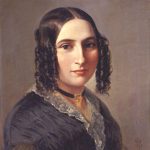- He loved to walk in nature
He was a great walker and had a passionate love of nature, even in depressingly prolonged periods of rain: “I never found it dull” he said “Even when it rains I just have another kind of beauty”.
2. He was very good looking when young
As a young man he was very handsome smart and attractive to women. Here is a recent computer rendering of Johannes Brahms pictured in his 30s by Hadi Karimi. In his later years he grew a long beard and moustache and was generally untidy.
3. He was a caffeine addict!
He loved his coffee and his beer (prodigious quantities of it).
4. He loved children – and they liked him
He delighted in the company of children and the easy relationship he formed with them. He was attracted to their loyalty and directness. He knew and was well known to all the children of the neighbourhood. On his frequent walks in the woods around Vienna and often brought penny candy with him to hand out to children.
5. He could be very blunt
“If there is anyone here whom I have not insulted, I beg his pardon.”
Johannes Brahms, composer (on his way out of a party)
6. He was an avid reader and collector of manuscripts
Even from a young age Brahms was an avid reader. He spent many of his summer holidays with Widmann the noted editor and would on many occasions visit his friends the Schumanns to borrow from their extensive library. He also collected manuscripts of Bach, Mozart, Beethoven, Schubert and Schumann, including many first editions.
7. He remained fairly neutral about Wagner’s work:
“I do not wax rhapsodic – neither about his work nor about Wagner in general. But I listen to it as attentively as possible, that is, as often – as I can stand it”
Brahms on Wagner and Die Meistersinger (letter to Clara Schumann 28 March Vienna 1870)
8. He made friends, lots of them – musicians, writers, artists, rich businessmen, influential people.
Brahms was a lifelong friend of Johann Strauss II, though they were very different as composers. Brahms even struggled to get to the Theater an der Wien in Vienna for the premiere of Strauss’s operetta Die Göttin der Vernunft in March 1897 before his death. Perhaps the greatest tribute that Brahms paid to Strauss was his remark that he would have given anything to have written The Blue Danube waltz. An old anecdote recounts that when Strauss’s wife Adele asked Brahms to autograph her fan, he wrote the first few notes of the “Blue Danube” waltz, and then wrote the words “Unfortunately not by Johannes Brahms!” underneath.
9. He was very successful, and generous
Brahms performed, composed, gave piano lessons, attended operas and concerts (never missed one of the afternoon concerts by his friend Johann Strauss). His success made him a wealthy man. He was generous, and helped many aspiring musicians (including Dvořák).
Dvořák’s son-in-law Josef Suk recalls an unforgettable experience of Dvořák’s remarkable friendship with Vienna’s famous and honoured citizen Brahms:
“I went with Dvořák and his wife to visit Brahms and it is a visit I shall never forget. Brahms (again) tried to persuade Dvořák to move to Vienna and because he knew that he had a big family, he said: “Look here, Dvořák, you have a lot of children and I have almost nobody. If you need anything, my fortune is at your disposal.” The tears came into Mrs Dvořák’s eyes and Dvořák, deeply touched, seized the master’s hand….. On the way back to the hotel Dvořák was silent…At last he exclaimed: ‘Such a man, such a fine soul – and he doesn’t believe in anything, he doesn’t believe in anything!”
Antonin Dvořák. Letters and Reminiscences. Otakar Šourek (translated from the Czech by Roberta Finlayson-Samsour). Artia, Prague 1954
10. Brahms was modest, but with a strong sense of self worth
Brahms was a positive man. He was modest, but had a strong sense of his own worth as a musician.
11. He was in love, but never married
His relationship with Clara Schumann is at once one of the great romances and great tragedies in music history. While the evidence of their feelings for one another are clear from their tender and passionate correspondence, they never married even after the tragic demise of Clara’s husband. Clara and Brahms’ impossible romance is said to have inspired Brahms 3rd symphony; what is known is that he dedicated many of his pieces to her including the Variations on a Theme by Haydn.







